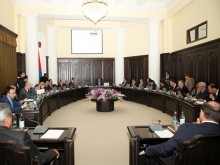News
Armenia Improves Position in World Bank’s Doing Business 2016 Report
29.10.2015

A regular Cabinet meeting was held today, chaired by Prime Minister Hovik Abrahamyan. Before proceeding to the agenda, the Prime Minister referred to the World Bank’s Doing Business 2016 report.
The World Bank has published the Doing Business 2016 report, stating a 3-point improvement in Armenia’s position, which was promoted to the 35th position among 189 countries.
Armenia was included in the list of countries that have succeeded three or more reforms in the past year. Armenia has improved its performance in three categories: facilitation of building permits, simplification of cross-border trade arrangements and contract enforcement quality.
Armenia has simplified the procedure to be followed in getting building permits. In particular, design and construction oversight-related technical requirements are no longer applied to low-risk projects.
After joining the EAEC, Armenia has reduced the time and cost of documentation and border crossing procedures. As a result, the amount of time required for border clearance was reduced to 3 from 50 hours. Our country moved up to the 29th position from 58th under this indicator.
As a result of amendments made to the Judicial Code, the appointment of judges is carried out randomly, mediating a completely automated system that resulted in improved quality of contract enforcement. In terms of company registration, Armenia ranks among the best countries of the world at the 5th place among 189 economies. Our country is the 14th best nation in terms of property registration.
Starting a business in Armenia takes 3 days. This is comparable to Denmark’s performance, which is a worldwide leader in this area. The world average is 48 days for property registration, while it only takes 7 days in Armenia.
At the same time, we must remember that there are always opportunities for improvement, and this should be the focus of all government departments. Our commitments in this area will be under my personal supervision.
I hereby instruct the Minister of Economy to submit a detailed report on the results of our programs and activities for publication in media outlets,” Hovik Abrahamyan said.
The Government decided to allocate 16100.0 thousand drams to Aygehovit community in Tavush region as a compensation for uncollected grapes harvest in the vineyards of the community due to shelling.
The grapes harvest is complete in Aygehovit, with the exception of 46 farms which are kept under fire by the enemy. The damage caused to 22.62 hectares of vineyards amounts to AMD 16100.0 thousand with an estimated cost of 140 drams per kilogram.
Stressing the importance of the decision, the Prime Minister noted that border communities are the government’s focus. “Practically it was impossible to collect the harvest. Therefore, the Government decided to offset the loss from its reserve fund.”
The meeting approved a set of draft amendments to the laws on NGOs, funds and other legal acts. The amendments define the legal status of non-governmental organization, streamlining their establishment, management, operation, reorganization and liquidation procedures.
In this connection, the Prime Minister said, “Highlighting the role of civil society in the development of democracy, taking into consideration the public debate as well as the findings and suggestions voiced throughout professional studies, the Government of the Republic of Armenia has developed a program for the promotion of civil society, as well as implementation of institutional and legislative reforms.
It has been approved by both international organizations and civil society. I would like to highlight a number of proposed innovations, including in particular, the introduction of the institute of volunteers, which not only ensures the well-being of any society, but also enhances the living standards.
I would also highlight the possibility for non-governmental organizations to carry out extended entrepreneurial activities, which could be of fundamental importance to the independence of NGOs in terms of financial stability. The draft’s important aspect is that it focuses on the accountability of NGOs, with clear distinction made between the government-supported NGOs and the ones funded from other sources.
Finally, the possibility of online registration of NGOs will be a strong boost for founding new NGOs not only in Yerevan, but also in the provinces in order to address emerging challenges.”
The meeting approved the Infrastructure and Rural Finance Support program financing agreement signed on September 3, 2015 between the Republic of Armenia and the OPEC Fund for International Development.
The program aims to improve the population’s economic and social status by providing sustainable income opportunities for growth and employment. The program has three components. In particular, through investments and loans management and technical assistance will be provided to those small and medium-sized private companies cooperating with poor rural producers in the agricultural value chain. The program will also help improve rural water supply and irrigation systems in Shirak, Lori, Tavush, Gegharkunik, Vayots Dzor and Syunik marzes of Armenia, with a priority given to the communities with highest indices of poverty.
Appreciating the program, Prime Minister Hovik Abrahamyan said it should be implemented as shortly as possible.
